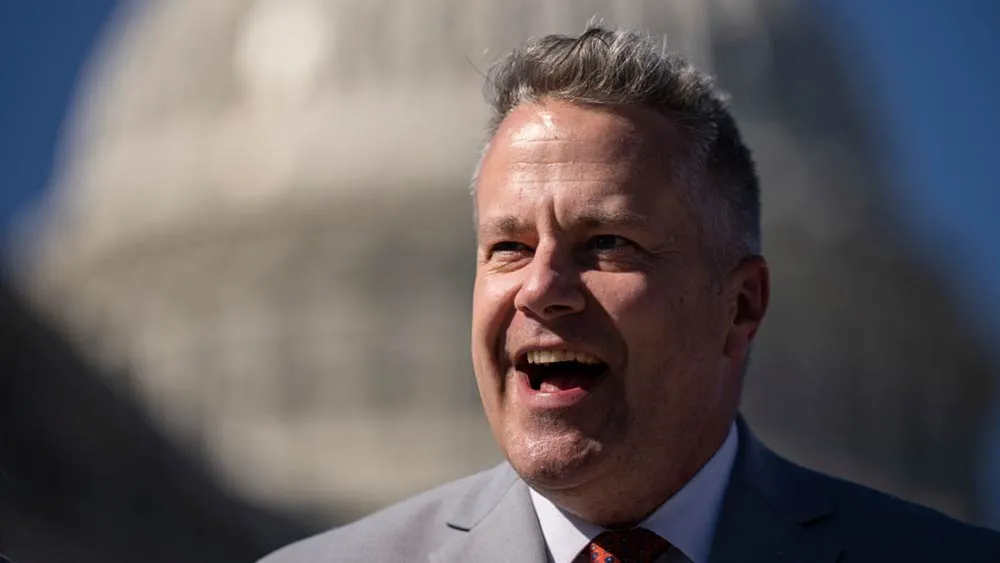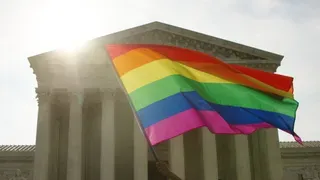January 3, 2012
GOP Candidates' Anti-Gay Stances: Winning Strategy, Or Out of Touch?
Peter Cassels READ TIME: 7 MIN.
It feels like 1992 all over again. That year, an unsuccessful GOP presidential candidate, the right-wing fire breather Pat Buchanan, gave a speech at the party convention in which he coined the phrase "culture war" to describe such progressive issues as gay rights and abortion.
As this long-anticipated season of presidential primaries finally gets under way, most of the current crop of Republican candidates has been falling over each other to capture the votes of social conservatives and evangelical Christians by coming out strongly against abortion and gay rights.
Their votes are seen as solid gold to the Republicans' strategists. In 2008, 60 percent of voters in the Iowa caucuses were evangelicals. A similar number voted in the South Carolina primary that year.
It's a political truism that Republicans run to the right in primaries, just as Democrats run to the left, because that's where the votes are. Most candidates in both parties move to the center in general elections to capture the crucial independent voters.
What looks like a winning strategy in many of the primaries may prove to be a handicap in the general election, according to both straight pundits and gay political activists. EDGE conducted e-mail interviews with representative members of both groups.
Five candidates -- Michele Bachmann, Newt Gingrich, Rick Perry, Mitt Romney and Rick Santorum -- have signed a pledge put forward by the National Organization for Marriage to oppose repeal of the anti-gay Defense of Marriage Act.
Homophobic One-Upping Each Other
The purported front-runner, Mitt Romney, did state recently that, overall, he supported gay rights. But he hastened to add that marriage should be only between one man and one woman. Interestingly, Romney is still catching flak from conservatives such as virulently anti-gay group Mass Resistance for being too much in favor of gay rights.
As for Santorum, he has stated that Romney is running to the left of President Barack Obama on same-sex marriage.
Gingrich has been particularly vocal in his anti-gay rhetoric. He recently blasted so-called activist judges for seeking "to limit the freedom of others to express their deeply held religious commitments to, for example, the value of every human life and to marriage as between one man and one woman."
In mid-December, Gingrich proposed a presidential commission on religious freedom that would investigate how students are being "force-fed beliefs about same-sex marriage, sexual orientation and abortion." He compared it to celibacy for priests.
Gingrich has gone so far as to reject LGBT Republicans. He told a gay Iowan he should vote for Obama. Not only GOProud, but the more moderate gay group the Log Cabin Republicans
This Time, Blowback from Voters
Probably to their surprise, some very intrepid everyday Americans are challenging such statements. Throughout the present campaign season, the candidates' anti-gay positions have been getting blowback. Iowans questioned Bachmann for
her anti-marriage position.
Perry, too, was challenged for saying he would reinstitute the ban on gays serving openly in the military. A veteran, a straight man, shouted "Shame!" at him for a notorious ad that unfavorably compared serving openly in the military to prayer in schools. And a gay veteran quizzed Romney during a campaign stop in New Hampshire () on his opposition to same-sex marriage.
Marriage Equality USA has produced to find out how the contenders rank on a list of 12 gay rights issues.
Perhaps the candidates should be checking opinion polls before they say anything. Or they should look at the evolving positions of voters, which have evolved markedly since the last two presidential election cycles. A slight majority of all voters now support same-sex marriage.
According to a Washington Post poll, 6 out of 10 voters under 30, including Republicans, now favor full marriage equality. Even more telling, several prominent Republicans now support gays and lesbians being able to marry. They include former first lady Laura Bush, daughter Barbara, Lynne and Dick Cheney, and 2008 presidential nominee John McCain's wife Cindy and daughter Meghan.
A self-described "progressive Republican," Meghan McCain is fighting what often seems like a one-woman campaign to pull her party kicking and screaming into the 21st century. Speaking at the 2009 Log Cabin Republicans convention, McCain said there was "a war brewing in the Republican Party" between the past and the future, and that "most of the old school Republicans are scared shitless of that future."
She wrote in 2009 in her column in The Daily Beast, "At the most basic level, sexual orientation should not be a factor in how you are treated. If the Republican Party has any hope of gaining substantial support from a wider, younger base, we need to get past our anti-gay rhetoric."
Larry Sabato, director of the Center for Politics at the University of Virginia and one of the most prominent presidential-election analysts in the country, mentioned evolving attitudes in an interview with EDGE. "There has been a sea change in Americans' views on gay rights," he said. "Large majorities now favor almost every category of anti-discrimination rights."
"Those between 18 and 33 are very attuned to social issues like gay rights, and by a wide margin, they take the libertarian view," Sabato noted.
GOP Sea Change on Social Issues
Darrell West, a vice president at the Brookings Institution, a prominent think tank, agreed.
"A growing number of voters favor various aspects of gay rights so it is short-sighted for Republican candidates to oppose popular proposals," said West. "It does not advance long-term GOP prospects. Younger voters are very sympathetic to a gay rights agenda and their power will increase in coming years."
Veteran observer Sabato detects a dramatic change among Republican students on social issues. "While there are certainly social conservatives still in their number, majority opinion now seems firmly tilted in the libertarian direction on gay rights," he told EDGE.
"I've come across a fair number of pro-life/pro-gay rights young Republicans, interestingly," he added. "Sooner or later, this trend will manifest itself in GOP politics. Eventually, these young Republicans will age and begin running things -- and the same is true for all current 18-33 year olds. When they are fully in charge, remaining barriers to gay and lesbian equality will likely fall. Generational replacement is an absolute inevitability, and there are policy consequences."
Gay Rights: Out for Good
That's not to say that gay rights should not be a taboo topic of discussion among presidential candidates, both analysts contend.
"In my view, absolutely anything the candidates choose to raise should be an issue," Sabato said. "No one should draw lines about what it is legitimate or illegitimate for a candidate to raise. First Amendment rights apply, especially to political speech." He added this caution, however: "They have to live with their positions and they will be held accountable for them."
"Candidates should worry about anti-gay positions backfiring both in the short as well as the long term," warned West.
GOProud believes its members are more concerned about reining in government spending and solving problems with the economy, just like most Americans who will vote in the general election this year. The two-year-old, highly controversial group of LGBT Republicans split with Log Cabin because they believed the latter were too liberal,
"Many of the candidates' policy proposals that are good for all Americans are especially good for gay Americans," said Jimmy LaSalvia, GOProud's co-founder and executive director. "Issues like fundamental tax reform, entitlement reform and free-market-based healthcare reform are all issues that gay voters especially care about."
LaSalvia doesn't believe candidates who most vehemently oppose same-sex marriage in the primaries are going to be the party nominee. "At this point in the race, I just don't see how Bachmann, Perry or Santorum can win the nomination," he asserted. "They are the candidates who are using this issue as the centerpiece of their campaigns. I predict that we will have confirmation that using gays as a wedge is a losing strategy once we see those three drop out."
"Young conservatives aren't any different than any other younger voters in America," LaSalvia said. "They have grown up with gay people in their lives, they know gay conservatives, they understand and have thought about how issues affect their gay friends and family."
LaSalvia failed to mention Gingrich's opposition to marriage equality. Many observers believe Romney will be the eventual Obama opponent. Romney, in the eyes of many, has done an about-face since serving as the governor of Massachusetts who, under court order, initiated the first gay marriage laws in the country and who, more significantly, said he was more pro-gay rights than Ted Kennedy when he unsuccessfully tried to unseat the legendary U.S. senator.
Gay Democrats: Homophobia in GOP DNA
The National Stonewall Democrats say the Republican Party includes anti-gay discrimination in its party platform, so it isn't surprising that the majority of its presidential candidates are taking positions against same-sex marriage and other issues.
"It simply goes to show how out of touch the Republican Party has become of late and how desperately they need fresh leadership and new ideas," said Interim Executive Director Jerame Davis.
He added that gay issues will remain a part of presidential politics "until LGBT Americans enjoy full equality under the law and Republicans cease their attempts to roll back the gains we've made." Davis agrees that the candidates' anti-gay positions could backfire, especially when the eventual nominee campaigns in the general election.
"With drastic changes in how most Americans view LGBT issues, the economy still sputtering, troops still in harm's way around the globe and so many other concerns to address, continued attempts to use our community as a wedge to create division is a losing strategy," he said.
Peter Cassels is a recipient of the National Lesbian and Gay Journalists Association's Excellence in Journalism award. His e-mail address is [email protected].






